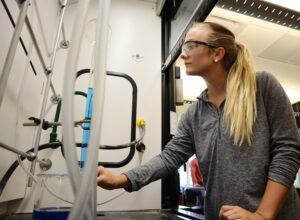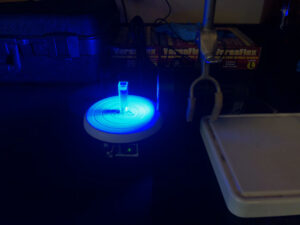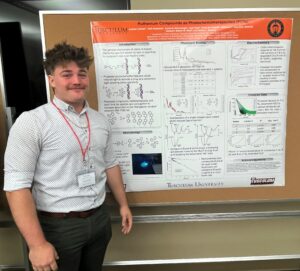 Since 2018, Tusculum University students have had the opportunity to contribute to the global fight against cancer. Dr. Dennis Ashford, associate professor of chemistry, launched an initiative for undergraduate chemistry and biology students to examine a new type of drug to treat cancer.
Since 2018, Tusculum University students have had the opportunity to contribute to the global fight against cancer. Dr. Dennis Ashford, associate professor of chemistry, launched an initiative for undergraduate chemistry and biology students to examine a new type of drug to treat cancer.
The project has brought 20-25 chemistry and biology students to the chemistry lab to create 15-20 compounds, with five more to go in this phase of the research project. The group performs some of the testing on the compounds and partners with other universities on the analysis.
These students have published a paper on their research in Dalton Transactions, a chemistry publication that features research results. They have also made presentations within the industry, including at the American Chemical Society Conference in San Diego.
 To summarize, these undergraduate researchers, under the guidance of Dr. Ashford, are looking at potential medications that can be activated by light to kill cancerous cells. The reason for pursuing the new drug is that standard chemotherapy can be tough on the body and can impact noncancerous cells.
To summarize, these undergraduate researchers, under the guidance of Dr. Ashford, are looking at potential medications that can be activated by light to kill cancerous cells. The reason for pursuing the new drug is that standard chemotherapy can be tough on the body and can impact noncancerous cells.
Tusculum’s research is focused on creating a drug that will kill the cancer but provide much less severe side effects from treatment by distributing medicine solely to the cancerous portion of the body.
Students and Dr. Ashford discovered an interplay between light absorption in the therapeutic window and anti-cancer activity based on very minor structural changes in the compounds. This was a major finding in the research of the type of medication Tusculum is examining and was the subject of the students’ publication in Dalton.
Since the project began, students have built upon the research and findings of their predecessors in the classroom. Tusculum would welcome the opportunity to develop the drug that ultimately is approved by the Food and Drug Administration. Even if that does not happen, students and Dr. Ashford are contributing to the discussion and exploration of this medication, which could lead long term to the development of the drug by someone in the scientific field.
From the beginning, one of the major benefits of this project has been preparation for the next step in these students’ academic and professional journeys. Undergraduate research of this type is not common at colleges and universities. Tusculum’s research initiative prepares students to enter a comprehensive research program at the master’s and doctoral level or pursue a career in industry immediately after graduation. Many of the participants have gone to medical school or entered doctoral programs.
The research project has benefited from the financial support of the Arthur Vining Davis Foundations, the East Tennessee Foundation, Eastman and the Appalachian College Association totaling about $150,000. The grants and fellowships have contributed the purchase of equipment, enabled students to receive stipends to work on the project during the summer and provided additional resources so Dr. Ashford can dedicate more time to the project.
Anyone who is interested in financially supporting this initiative can contact the Office of Institutional Advancement at 423-636-7303 or email Dr. Ashford at dashford@tusculum.edu.
 I am Konrad Sehler. At this time, I am going into the last year of my undergraduate studies. I major in chemistry, with a minor in biology. I have conducted anti-cancer drug research under Dr. Dennis Ashford for roughly 2 1/2 years; to say the least, it has been an absolute joy and the best thing I have done with my time at Tusculum.
I am Konrad Sehler. At this time, I am going into the last year of my undergraduate studies. I major in chemistry, with a minor in biology. I have conducted anti-cancer drug research under Dr. Dennis Ashford for roughly 2 1/2 years; to say the least, it has been an absolute joy and the best thing I have done with my time at Tusculum.
This opportunity has been one of the biggest blessings to me as it has ensured me of going down the career path right for me and getting me prepared for graduate school. The undergraduate research focus is in photochemotherapeuic compounds, or medicine that only works when struck by light. The tedious balancing of the complexes to be stable enough to be synthesized and transported throughout the body without being toxic, while also being brittle enough to be broken down by illumination is a grueling task but an amazing experience that I believe has prepared me for the next step of my career.
This endeavor connects students directly with a disease that has directly or indirectly impacted most people in the world. Through their research, students are a position to improve people’s quality of life and enhance health care delivery.
Students have the opportunity not only to understand the science behind cancer drugs but to be participants in creating the next generation of medications. They work in the lab conducting experiments, making adjustments based on what they learn and presenting their results in group settings.
Students are well-prepared to pursue a job in the chemistry industry based on the research abilities they have honed and the real-world scenarios they have encountered during their studies. They are also positioned for additional academic studies that will prepare them for additional career opportunities.
Participating in this research initiative provides opportunities to travel for presentations and gives students satisfaction that they are making a difference in the world.
Potentially developing a drug that will change the landscape in cancer treatment and ease some of the challenges associated with traditional chemotherapy is an excellent way to demonstrate compassion and support for fellow humans at a difficult time in their lives. This project demonstrates students’ and the university’s concern for those diagnosed with cancer.
12-17-20: Research into cancer-fighting drugs receives more support with fellowship for Tusculum professor
8-21-20: Research on renewable energy and cancer by Tusculum students earns more financial support
7-2-19: Arthur Vining Davis Foundations grant to Tusculum will expand research on cancer, renewable energy
11-26-18: Tusculum chemistry and biology students begin new undergraduate research program